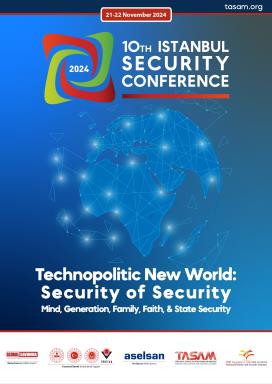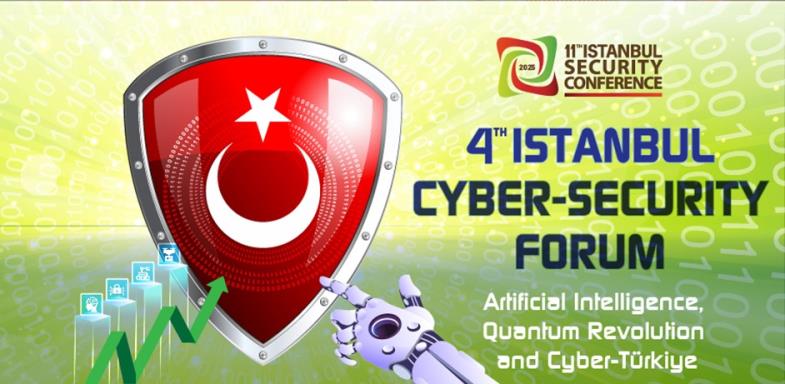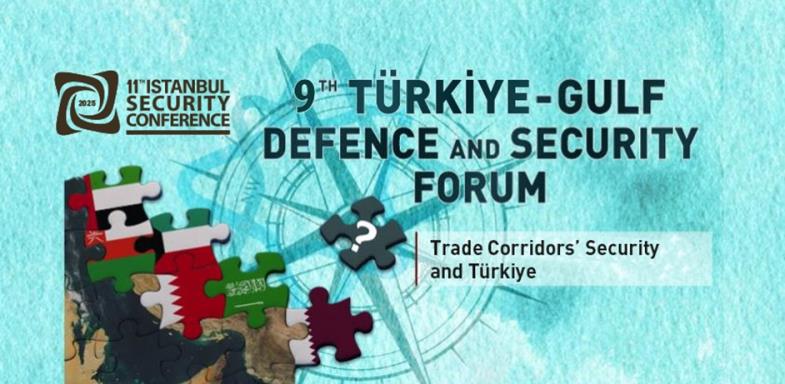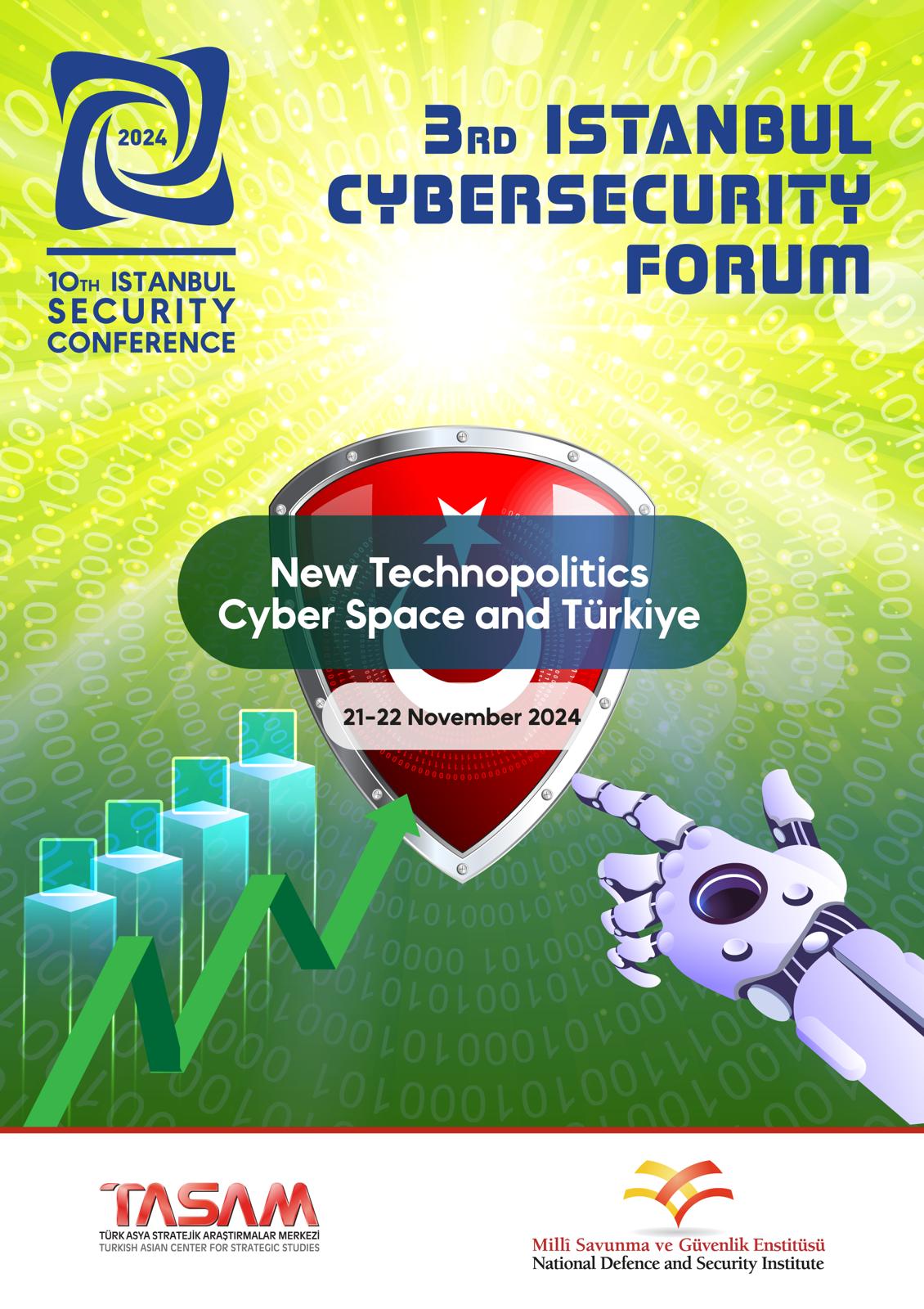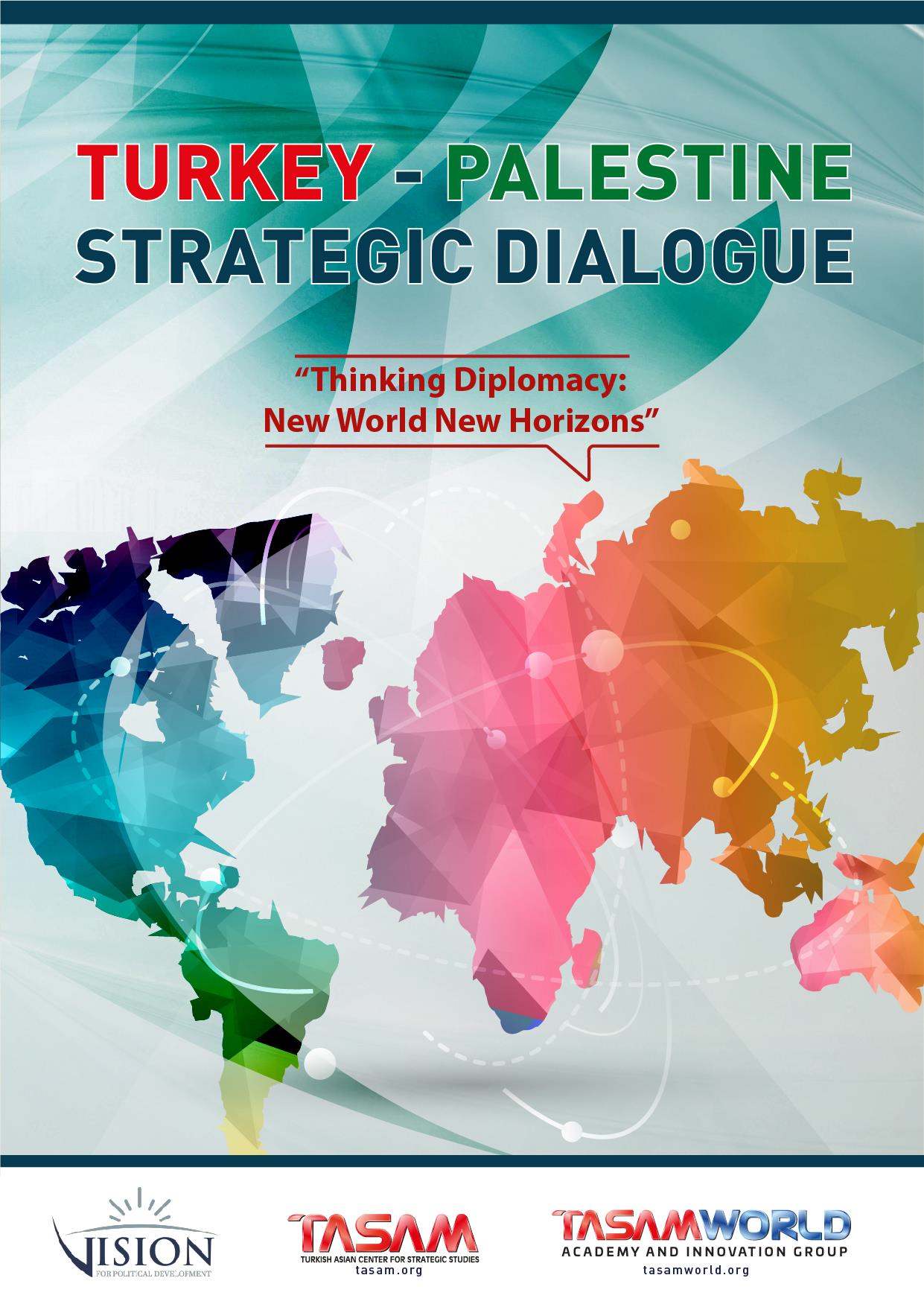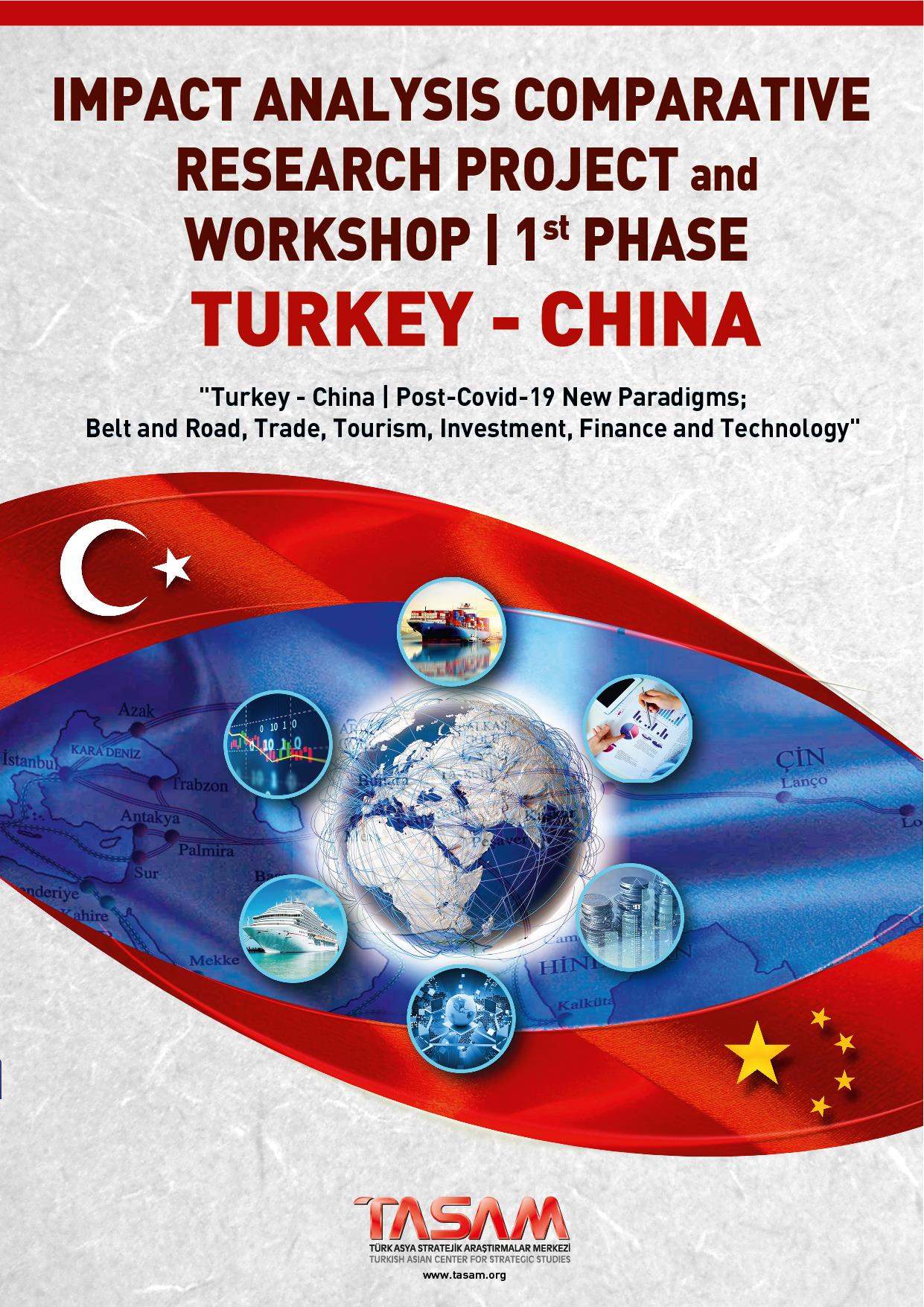10. ISTANBUL SECURITY CONFERENCE I 2024
TÜRKİYE DECLARATION
TÜRKİYE DECLARATION
The Istanbul Security Conference, organized for the first time in Türkiye in 2015 and held for the tenth time this year, was organized by TASAM National Defense and Security Institute with the main theme of Technopolitical New World: Security of Security was organized by TASAM National Defense and Security Institute with the main theme of "Security of Mind, Generation, Family, Faith and State" on 21-22 November 2024 at Wish More Hotel Istanbul. The 10th edition of the Istanbul Security Conference, which has become a brand on a regional and global scale, was attended by a wide range of speakers and protocols in every discipline from different countries and regions. All relevant authorities from Türkiye were represented at the Conference and the sessions were followed institutionally.
In addition to the Conference, on November 21, the 3rd Istanbul Cyber-Security Forum with the theme "New Technopolitics Cyberspace and Türkiye", the 6th Maritime and Maritime Security Forum with the theme "Turkish Maritime Vision 2053", and the Re-Asia Security Forum with the theme "New Technopolitics and Security Partnership"; on November 22, the 7th Türkiye - Africa Defense Security and Space Forum with the theme "Africa 2063 Vision Security Partnership", the 8th Türkiye - Gulf Defense and Security Forum with the theme "Red Apples for Security Partnership", and the Asia Anew Security Forum with the theme "New Technopolitics and Security Partnership". Türkiye - Africa Defense Security and Space Forum with the theme "Africa 2063 Vision Security Partnership", the Türkiye - Gulf Defense and Security Forum with the theme "Red Apples for Security Partnership and the Asia Anew Security Forum with the theme "New Technopolitics and Security Partnershipwere held as co-events with simultaneous translation. Bringing together distinguished participants from nearly 40 countries ranging from the US to China, Russia to Iran, the 10th Istanbul Security Conference has been a global platform where important views and ideas were shared with the aim of competitive new perspectives centered on Türkiye and Istanbul.
As a result of the conference, the following findings and recommendations were made and agreed to be brought to the attention of all relevant authorities and the public:
A - GENERAL
- With the theme "Technopolitical New World: The of Security" theme, it was reaffirmed that the Istanbul Security Conference is a "School" that builds networks and capacities on a large scale, and that it is a strategically transformative event with its visionary stance at the center of the global security ecosystem.
- Under the concept of "Technopolitical New World: of Security" concept, it is emphasized that security crises that directly affect people, states and society in the global system should be addressed not only from a military perspective, but also from epistemological, technological and socio-economic dimensions.
- The "Age of Hyper-Technology" triggered by technological leaps necessitates the development of new security approaches ranging from the individual to the nation. The critical importance of holistic security approaches such as Security of Mind, Generation, Family, Faith and State has been persistently emphasized.
- The "decentralized center" and its decentralized instruments derive their power from technopolitical positions. While this paradigm redefines the distribution of power in international governance, particular attention has been drawn to the transformative impact of areas such as the Blockchain ecosystem, artificial intelligence and quantum technologies on the global system.
- Humanity is in a period in which the concept of truth is being transformed by the paradigm of "Science, Theology and the New World Beyond Truth". In this process, it has been emphasized that innovative mechanisms should be developed to protect the security of mind and information.
- Alternative models such as Pax Sinica, Turkish Century, Arab Century represent the restructuring of global dynamics in a multipolar world order. In this context, the concept of "Failure to Succeed" stands out with its strategic importance in a multidimensional competitive environment.
- It was stated that future security strategies should be rebuilt on the basis of interdisciplinary approaches such as "Neurodiversity, Chaos Mathematics, Reverse Mathematics and Mathematics of Emotions". When science is not balanced with ethical and moral boundaries, it leads to destruction; when art is deprived of its values, it leads to decay. Events such as the Russia-Ukraine War keep the risk of a nuclear accident on the agenda, which could happen at any time. The nuclear threat is a legacy of the 1945s, but today, broader and more complex risks have emerged that threaten the very existence of humanity.
B - THEMES
- The need for security stems from nature's tendency to return to an orderly state. People are in a constant search to feel secure in the future. In this context, in human societies, law is the fundamental element that ensures internal balance. The pluralistic structure that has developed since Westphalia based on the sovereignty of states instead of a single central order has led to a lack of order in international law. Thomas Hobbes argues that the purpose of the state's existence is to prevent chaos and anarchy. However, it should not be forgotten that those responsible for providing security also need security.
- The concept of "security of security" refers to a sophisticated era in which even those responsible for providing security, such as police, military, gendarmerie and intelligence, now need their own security. This necessitates a radical mental transformation and revolution.
- In his book "The New Middle Ages", Alain Mine that in the period he calls decay or decadence, people become isolated and individualized. Decay or decadence refers to people breaking away from society and becoming more individualized than ever before. The New Middle Ages marks a return to a feudal structure. This structure is characterized by a system based on loyalty, lawlessness and fear. In this system, individuals become isolated and avoid mass action. Autocratic leaders and feudal administrations are at the forefront, and the rule of fear prevails. In the feudal order, there is a mafia system where there is no meritocracy. National armies The whole world, including the United States, aims to return to traditional military service. Professional military service in national armies is a medieval system. The police force has tripled in size due to fear management, local management and authority.
- Fiber optic wars are concentrated on sub-ocean cables, through which 95% of the world's internet data passes, and these infrastructures are becoming strategic targets. While the use of 5G in military technologies is transforming the communication infrastructure, cyber and physical attacks on critical infrastructures necessitate new security measures.
- There have been successful efforts to find solutions for managing a single crisis. Today, however, multiple global crises are occurring simultaneously. According to Herz's definition, a security dilemma arises when individuals or groups strive to become more powerful due to concerns of being attacked, dominated or destroyed. This pushes other groups to take similar measures and a mutual security race begins. Security dilemma refers to the tension and general insecurity that arises when one actor's security policies are perceived as a source of insecurity by other actors, which leads to counter-policies. This situation stems from the state-centered explanations that dominated the Cold War era.
- A security dilemma can be explained by choices and does not necessarily result in war or conflict. Booth and Wheeler (2008) argue that in the post-Cold War era, a security dilemma should not be confused with a situation where efforts to achieve security result in insecurity. A dilemma is a situation of being caught between two options. The security dilemma and security paradox can be explained as a state of doubt that arises from the realization of contradictions in the knowledge accepted by the human mind. Booth and Wheeler define a security paradox as a situation in which actors try to increase their own security while raising mutual tensions and making everyone feel less secure.
- In international relations, the classical understanding of sovereignty and the definition of anarchy have begun to erode, and the security paradox has begun to be discussed instead of the security dilemma. Deep security paradoxes at the root of security crises. This situation changes the "fundamental questions of human existence" (e.g., "What does man live for?") and makes man the main "operational target". In regions where security is increased, freedoms are curtailed, human living conditions deteriorate and terrorist incidents cannot be completely prevented.
- The new security architecture of the world has moved beyond state borders to take security measures through cross-border operations focused on external threats. However, this process causes the measures taken in the name of security to create a security paradox.
- The fact that countries that act with security rhetoric engage in an arms race is a clear example of the security paradox. When a state starts to acquire nuclear weapons, it pushes other countries to acquire nuclear weapons, increasing global security concerns. Developing technology and the arms industry the states of the world to continue to behave in a security paradox. In a world where security dilemmas and paradoxes are becoming increasingly complex, the effectiveness of international centers and mechanisms for solving global problems is becoming increasingly important.
- The security dilemma, political realism and political idealism resulted in increased armament. In this period, the security paradox has become more pronounced, with countries continuing to arm themselves despite signed agreements and diplomatic commitments.
- Today, the importance of remaining human is emphasized above all else. The uncontrolled development of technology and the asymmetric control of artificial intelligence by the actors who control it make the struggle to remain human more difficult. The ecosystem of thought is a critical factor for the future of a country, and countries that cannot establish their own ecosystem are faced with the problem of survival. In this context, uncertainties about the future of human existence are deepened by security risks. This situation increases the importance of human-centered policies and strategic planning.
- Where you are in technopolitics will determine where you will be in geopolitics. Artificial intelligence has started to expand its sphere of influence and transform control mechanisms in an asymmetric manner. The main issue is the evolution of technopolitical structures into geopolitical order and the key role of artificial intelligence in this transformation.
- We are entering an era in which states need to take more initiative in matters of faith and culture. The European-based positivism that emerged with the industrial revolution popularized the idea that science should replace religion and marginalized the influence of religion. Today, conventional science is facing an existential crisis. This has raised the question of the security of faith.
- Technology addiction, the spread of a uniform culture, overt and covert starvation have led a decline in IQ levels in many countries. This IQ decline also affects the quality preferences of politicians and decision-makers.
- Although democracy functions as a system based on majority voting, it is at grave risk today and in the future. Meritocratic Democracy should be discussed as a concept that can strike a balance between elitism and democracy.
- Vaccines and pseudo-treatments can also be considered as part of the decentralized center structure. Overdose deaths are on the rise and unhappiness is widespread in the US. The widespread use of substances such as fentanyl and amphetamines stand out as new key elements of this process.
- Climate manipulation is also emerging as one of the decentralized instruments of a decentralized structure. This is something that nation states are caught unprepared for, and there are growing demands in countries like the US to stop such manipulations.
- Hidden hunger is when people do not get the necessary vitamins and minerals despite eating, while overt hunger is when people do not have access to basic food. Around 3 billion people around the world, including Türkiye, face these problems. Ninety percent of today's diseases are caused by a lack of vitamins and minerals that are inherent and essential for the body. Structural problems in agriculture, food and livestock production, artificial interventions in production processes and disruption of the nature of production are the main reasons for this. These problems are reflected in areas such as the immune system, reproductive problems and many chronic diseases.
- Another issue is virtual gaming and gambling addiction. For example, the turnover from virtual gambling alone in Türkiye for 2023 is estimated to reach 50 billion dollars according to official figures. Türkiye's export profitability is 4.7%. In this context, the fact that a figure several times higher than Türkiye's annual export profitability is transferred abroad through virtual gambling is considered as a security weakness.
- The sum total of all this is a process of demographic death and demographic catastrophe. In the process, humanity has entered a cycle of self-destruction without the need for armies or nuclear bombs. Therefore, from the perspective of reason, generation, family, faith and state security, there is an urgent need for a security revolution that is compatible with macro policy for both the international system and nation states.
- a possibility of a pandemic of mental illness from 2024. In 2024, statistics on violence, homicides and suicides - which some countries do not release - show abnormal increases. This is to increase much more in 2025 and beyond. The possibility of this turning into a pandemic is not a far-fetched scenario.
- Humanity is losing its ties with its history, personality and environment and is experiencing a long period of decline. Today, processes such as new capitalism, the search for alternative systems to capitalism, new fascism, and the struggle of great powers for resources and markets are being observed. The climate crisis, one of the biggest threats posed by capitalism, disrupts social balances and accelerates migration movements and local wars.
- New technologies are being shaped by concepts such as "fake news", war robots and big data, and in the hands of those fighting these threats. Documents on artificial intelligence and human rights herald a transformative era in human history. The political impact of the Balfour Declaration, as well as the US Declaration Artificial Human and the European Union's Artificial Intelligence Act are among the important documents that frame this new era.
- Artificial intelligence has emerged not only as a technological innovation, but also as a phenomenon that has inspired political revolutions and shifted the geopolitical balance of power. Powers such as the United States, the European Union and China are in an intense race for strategic superiority in AI technologies.
- Technopolitics is no longer just a concept, but a documented phenomenon. Artificial intelligence is recognized as a law that emphasizes the impact of technological developments on the world economy. Artificial intelligence is a new age revolution.
- The Ukraine-Russia and Israel-Hamas conflicts show that regional crises lead to global fluctuations. What is happening in Gaza is a humanitarian crisis rather than a humanitarian crisis. The US is unable to maintain a unipolar world order in a strategic squeeze.
- Global warming is leading to resource depletion and internal divisions within countries. In Nigeria, impacts such as desertification and sea level rise are leading to loss of agricultural land and migration, which in turn increases ethnic conflicts. The warming of the Earth and the change in the climate in the north of Russia are accelerating the discovery of new mineral and fuel resources, triggering a global struggle.
- As fossil fuels remain important, the importance of deep-sea mining is increasing. Perovskite solar cells that convert sunlight into electricity with 25% efficiency, the construction of energy islands and deep-sea mining are developments shaping the future of energy policies.
- In northern Russia, increasing drought and decay are the scale of the struggle over rare elements. In Siberia, melting glaciers have led to forest fires and serious setbacks in agriculture and industry. Russia's new target is the Arctic. The Arctic contains the melting glaciers and the resulting usable and exploitable resources, and will be one of the main theaters of a possible World War III.
- Massive migration from the Middle East a serious challenge for Türkiye. The migrant population in Europe, which exceeds 10 million, has led to an increase in disinformation and nationalism, and Europe is struggling with a surge in asylum applications.
- In Africa, Libya and relatively Morocco stand out as migration transit points. Human trafficking structures, where human rights and humanitarian values are ignored, are effectively at these points. Türkiye is considered as a solution center for migration. The crisis of international law and the devaluation of legal channels lead to cultural tensions on a global scale.
- India is often a source or transit country migrants, not a solution center for migration management or international migration policies. Especially the policies of the Modi era have alienated 300 million Muslims in the country and triggered the psychology of potential migrants. Saudi Arabia should not be considered as a solution center as it only accepts economic migrants.
- Today, increasing energy demand on a global scale brings environmental concerns and sustainability concerns to the forefront. This situation reveals the need for a paradigm shift in energy production and consumption. While the changing energy paradigm refers to the transition to an environmentally friendly and sustainable safe energy consumption, nuclear energy plays a critical role in this process.
- With COP29, decisions were taken to increase nuclear energy. This situation leads to sustainability concerns. A transformation has emerged in which nuclear energy regains importance and negativities are tried to be affirmed. However, fossil fuels maintain their paradigmatic importance in global energy policies.
- The energy transition is not only a process of transition to renewable energy, but also nuclear energy. energy be considered as a transition to a system based on secure energy sources, including energy.
- Energy transition is a complex process with many challenges. Financing the energy transition is also an important issue. The world's top 10 economies have undertaken 75% of the investments required for the global energy transition. This situation is considered unfair by many countries and is seen as a disadvantage in terms of profit margins.
- As a transitional form of energy, nuclear energy is a type of energy that should be supported despite its negative aspects. Current energy security problems have made the shift towards nuclear energy somewhat mandatory. It is stated that secure energy sources should not be limited to renewable energy sources. Nuclear energy remains an important component of sustainable and secure energy consumption.
- Since the early 20th century, rapid changes have accelerated the process of digitalization of economic activities. Globalization, combined with advances in computer and communication technologies, has shaped economic structures. The concept of digital economy emerged with the development of information and communication technologies, enabling economic activities to be carried out on digital platforms.
- Industry 4.0 promotes digitalization and sustainability by transforming production and consumption processes. This process involves restructuring the economic structure with environmental, social and governance dimensions. The Sustainable Development Goals (SDGs) set by the United Nations guide this transformation with goals such as poverty reduction and environmental protection.
- Green finance refers to the financing of activities aimed at solving environmental problems. Investments in renewable energy projects aim to reduce carbon emissions and solve environmental problems. It also supports economic sustainability by increasing labor demand.
- Digital technologies such as artificial intelligence and blockchain are being used in green finance projects to improve efficiency, make processes transparent and support environmental goals.
- Digital currencies are defined as financial instruments developed on the basis of blockchain technology and not linked to central authorities. While cryptocurrencies provide transparency and speed in financial transactions, they raise environmental concerns such as high energy consumption. In 2024, Türkiye announced that it would increase the importance it attaches to green finance projects and started to take steps towards sustainability goals in this context.
- Innovations such as unmanned technologies and artificial intelligence are reshaping the balance of power in the international system.
- The development of automation and technology is reducing the influence of population on power. However, population still remains a critical factor, especially in assessing military structures, spheres of influence and national capacity. However, with the advancement of dehumanization and technology, even small and medium-sized states can invest in these areas and play a more effective role in the system.
- With the Industry 4.0 Revolution, the influence of the human factor in sectors such as defense, agriculture and industry has started to decline. Human beings are increasingly only involved in decision-making processes, while production processes are undertaken by robotic systems and artificial intelligence. This transformation brings with it new challenges such as overpopulation and economic impacts, leading to radical changes in the policies of states.
- The concept of power is reshaping the balance between population and technology. As technology transforms the influence of population in power formations, it is becoming increasingly important for countries to cultivate a qualified population. Especially in a world where artificial intelligence and automation stand out, countries that focus on qualitative growth and innovation gain an advantage in the international system.
- By developing and integrating artificial intelligence and Industry 4.0 technologies, China stands out in the global balance of power. With its investments in artificial intelligence, China aims to achieve not only economic superiority but also military and technological superiority. It is also developing comprehensive policies to revitalize its economic growth, which has been weakened by the US-China trade war and global economic uncertainties.
- Independent countries with systems based on robotic and humanoid technologies can achieve a strong position in the international system in economic, military and diplomatic fields by using this technological infrastructure effectively. With the efficiency and innovation provided by robotic systems, these countries not only manage their resources effectively, but also become decisive actors in global competition.
- The seizure of 80 tons of cannabis and 3.5 tons of heroin in 2003 demonstrates Türkiye's success in the fight against drugs. Traceable signals have increased interception rates and Türkiye has strengthened international cooperation. Regional differences in drug use rates across Türkiye suggest that socioeconomic and cultural factors are at play. Income level, education level and migration movements are among the main reasons for these differences.
- The lack of legal infrastructure and lack of supervision of maritime routes and ports means that drug trafficking remains a problem. Türkiye's increased security measures at the ports of Mersin, Istanbul and Samsun have yielded significant results in the fight against smuggling. The effectiveness of these policies is demonstrated by the decline in drug use in border cities thanks to the strengthening of border security against global criminal networks.
- Although there are 147 drug treatment centers in Türkiye, their insufficient capacity makes it difficult to solve the problem. The increase in drug crimes in countries with high income inequality demonstrates the impact of economic conditions on drug use and crime rates.
- Geopolitics has recently under the influence of technological developments. Artificial intelligence, big data, cybersecurity, robotic technologies and synthetic media are reshaping traditional geopolitical dynamics and making the digital world one of the new centers of geopolitics.
- Synthetic media, i.e. media produced by artificial intelligence, reveals the need to reassess the boundary between the real and the artificial. The ability of AI to mimic human voice, facial expressions and behavior raises important ethical and security issues, such as the manipulation of individuals' digital identities. This has the potential to have serious consequences not only for individuals but also for national security.
- The impact of disinformation on verification processes has become a topic of debate, especially in the age of synthetic media. Artificial intelligence-generated misleading content strains the capacity of verification systems and fake content to spread faster. In response, technology companies and research organizations are developing artificial intelligence and machine learning systems to detect fake content. However, the increasing complexity of disinformation and rapidly changing methods limit the effectiveness of these systems.
- The increase in artificial intelligence-supported armament reveals the necessity of international regulations that will increase deterrence. This aved the way for the proliferation of asymmetric conflicts and a change in the nature of warfare. a multipolar world order is seen as a positive for peace, the lack of effective international organizations increases the need for global cooperation. The increase in irregular and asymmetric warfare in the 21st century has led to the prominence of guerrilla warfare in particular, and has emphasized the importance of global governance mechanisms for the effective management of such conflicts.
- The use of nuclear weapons is considered as a deterrent due to the damages caused by a war without a winner, the arms race still . Among the great powers, nuclear weapons are seen as a means of ensuring dominance and balance in international relations. However, instead of preventing war, this has the potential to increase instability.
- The former Third World countries of the so-called Global South used to consist of states that pursued a policy of neutrality. Today, however, these countries are increasingly taking on more active roles in the global system and have a greater influence in economic, social and political spheres. Globalization prevents the individualization of states and necessitates an environment of peace. In the post-Cold War era, United Nations Security Council resolutions have generally been shaped in accordance with the interests of the United States and Western countries. This situation pushed countries to seek a multilateral democracy and increased the need for global governance.
- To avoid war, international organizations and countries must come together to an effective mechanism for cooperation. The United Nations needs to be restructured to work more to ensure peace and security. Global cooperation and multilateral diplomacy are indispensable tools to ensure world peace.
- Techno-imperialism is a structure that gains legitimacy through transnational capital's corporate colonialism and technological domination. Historical colonial structures have affected the global balance of power through technological developments. Post 9/11, digital surveillance and artificial intelligence have increased military and economic expansionism. Karl Marx's perspective is important in understanding capital accumulation and economic exploitation. Transnational organizations (IMF, NATO, GATT) support international capital. Technological independence is a critical element for national sovereignty.
- The West assumed a savior role by legitimizing its colonial ideologies through development aid and projects such as the Peace Corps. This process has been a tool to reinforce the hegemonic interests of transnational capital. Interventionist policies are combined with securitization strategies that support the hegemonic interests of transnational capital. Cicero's statement "The muscles and nerves of war are money" emphasizes this situation. Imperialist powers have strengthened mechanisms of global control through intelligence, military intervention and civilian policies. Environmental degradation, dispossession, displacement and human rights violations are the main consequences of techno- imperialism. Kant emphasized that the cosmopolitan world order is shaped by Western values.
- Türkiye's foreign policy and defense industry are coordinated to enhance its security capacity. NATO membership has enabled Türkiye to integrate into the Western security architecture and established strong ties with Western alliances. Moreover, in addition to the process of governing with coalitions and the focus on domestic threats, domestic political developments and threats have also shaped Türkiye's defense strategies. For instance, the Johnson Letter of 1964 and the US embargo the way for Türkiye to take steps to increase its independence by reducing foreign dependence in the defense industry. In addition, until 2011, Türkiye opened military bases in line with the goal of becoming a regional and global player with economic movements supporting the increase in production in the defense industry, and took strategic steps such as its role in the 2nd Karabakh War and Lebanon Diplomacy. In addition to its soft power strategy, Türkiye aimed to increase its global and regional influence with a more active defense policy by strengthening its self-defense and offensive industrial technologies.
- Civil society organizations (CSOs) play an active role in advanced democracies and carry out lobbying and public opinion-forming activities for the benefit of society. They play an important role in organizing societies and are strengthened by the participation of individuals. In a society where CSOs are strong, fundamental rights, freedoms and democracy are more advanced. Sometimes CSOs can fill political gaps by overriding states and serve as important actors of globalization in areas such as health, education, environment and human rights. Complementing public diplomacy, civil diplomacy raises awareness, influences political systems and contributes to solving global problems. Organizations such as Greenpeace and WWF shape global politics on environmental and climate change issues. However, the success of NGOs depends on their ability to remain neutral and independent. While they are strengthened by international support, maintaining their independence is critical and increases their impact.
- Changing family structure and the proliferation of social media have weakened traditional control mechanisms. Roles within the family have become more complex and parents are struggling to protect their children's mental and emotional health. Social media causes young generations to compare their own lives with idealized lives, which increases self-esteem problems and feelings of dissatisfaction.
- Younger generations are under the influence of the manipulated perception of reality imposed by digital media. This has weakened their ability to distinguish between right and wrong, leading them to make quick and superficial decisions. The constant effort to adapt to innovations strains mental health and weakens social bonds. While concepts such as justice, rights and ethics have lost their meaning, young people try to make sense of themselves in a manipulated reality, which negatively affects their mental health.
- When people cannot find their way in this artificial order, they are condemned to live in a perceptual false world. The responsibility of families is to consciously prepare new generations for this order by protecting individual values and social norms. However, the rapidly changing dynamics of the virtual world complicate this task. This situation reveals the need for change and adaptation on a wide scale, from the family to the individual, from society to the state.
- Theology and politics have played a formative role throughout history, with events such as the Crusades demonstrating the use of religion as a political tool. In the modern era, Israel's use of the concept of "existential threat" in the 1973 Yom Kippur War to gain international support and legitimize its security aexample of the instrumentalization of theological elements relations. While in Jewish belief, the gathering of the 12 tribes in Jerusalem symbolizes the messianic age, these theological arguments do not coincide with the political and national goals of the Zionist ideology, and the difference between the emphasis of Messianic beliefs on individual transformation and the political goals of Zionism complicates the effort to combine religious motivations with secular goals. When we look at the Gaza-Israel conflict on October 7, we see that a similar equation was attempted to be established with references that had messianic connotations, thus shifting an international conflict to theological grounds. Israel, which effectively used the concept of “existential threat“ to gain international support and legitimize its security during the 1973 Yom Kippur War, exhibited the same approach with messianic arguments on October 7. The arguments used are similar to the perspective put forward by the USA after the September 11 attacks.
- Israel's expulsion and annexation policies in the West Bank aim to undermine Palestinians' national identity and rights to land, and are constantly criticized for human rights violations and international legal debates. Population replacement policies and apartheid-like approaches deepen instability in the region and inflame debates on equality and human rights. Moreover, the effort to create a Kurdish Jewish identity is linked to Israel's and Zionism's strategies to shape its relations with ethnic and religious groups in the Middle East. Allegations of links to the PKK and YPG further complicate regional security dynamics, while the ban on gene analysis in Israel deepens the debate on identity politics.
- In 2023, Türkiye's birth statistics fell below one million for the first time, while the youth population rate dropped to 15.2%. While this marks a transformation in Türkiye's demographic structure, it also the risk of losing the advantages of a young population. While the decline in the young population will have long-term effects on the labor market, the increase in the elderly population will create an economic burden. Although education is expanding, employment opportunities need to be increased for the one million qualified individuals who join the labor force each year. Developing innovative education and employment policies to preserve the youth advantage is important for social equity and development goals.
- As of 2023, there are three million migrants under protection and 200,000 irregular migrants in Türkiye. These groups constitute 3.66% of the country's population and 97% of them live scattered in different cities. This makes social cohesion and integration difficult. As of 2017, approximately 2 million public order crimes were committed annually in Türkiye, with an increasing over the years. Between 2012 and 2021, a total of 2,103,804 public order crimes were committed and crime rates increased by 10% annually.
- Cultural differences and difficulties in migrant integration negatively affect social structure and threaten demographics, especially in border areas. Low levels of education and economic uncertainty among refugees increase criminal tendencies, with 88% of offenders working in jobs that do not require education. Sexual offenses are prominent among Afghan migrants and 115 people were recorded to have been prosecuted in this context.
- Infrastructure deficiencies, unemployment and housing problems in metropolitan areas increase physical and social disorder and contribute to the increase in crime rates. Crime rates have been steadily increasing since 2017. Long-term policies supporting the economic and social integration of migrants are critical to contain this increase and strengthen social cohesion.
- Today, the dizzying pace of technology has one of the most decisive factors of our time. While conflicts have increased due to global competition, efforts to access strategic resources and attempts to block these resources in the last two centuries led to the re-emergence of approaches reminiscent of colonial policies. Countries that stand out in the nuclear and space race continue to increase their power by gaining global prestige.
- US attempts to consolidate its hegemony continued with the Greater Middle East Project and new strategies developed in the 2010s. However, the goal of a unipolar world order failed to materialize. While the Clinton-era "America's Pacific Century" policy created mistrust, the Obama administration implemented the Asia First Project. By prioritizing the Asia-Pacific region, the US signed nuclear agreements with India against China and encouraged Japan, South Korea and Australia to arm themselves.
- The US aims to weaken Russia geopolitically and China militarily and economically. NATO's moves forced Russia to take action, and this process was seen as part of the measures to treat China as a threat. The Asia-Pacific region was reshaped as the Indo-Pacific, with the US establishing military bases in the Taiwan Strait and conducting exercises in the South China Sea. Acting with Cold War logic, the US is trying to disrupt China-Russia relations over Ukraine and Taiwan.
- The October 7 attack on Al-Aqsa is considered a planned operation and Russia and China are alleged to have supported Hamas. This development has made the Palestinian-Israeli conflict a part of global tensions. The open support for Israel and the uncertainty in the Middle East during the Trump era have increased regional and global instability. In the same period, following the peace initiatives in Ukraine, strategies towards China gained priority and tensions deepened on the Korean Peninsula. The coming years will be critical for developments in these regions.
- Regional Security Complex Theory provides an important framework for understanding Türkiye's role in the international system and identifies Türkiye as an "isolator" securitizing social, military and economic dynamics in the Eastern Mediterranean. In this framework, Türkiye's strategic importance is increasing.
- In the post-1991 period, Türkiye's Turkish Eurasianism policy as a result of the search for a multidimensional foreign policy. This approach advocates strengthening relations with Russia, China and the Turkic world by reducing dependence on the West. The rise of anti-Americanism, especially after the July 15, 2016 coup attempt, has reinforced this orientation. Cooperation in the fields of energy, trade and defense industry support these policies.
- In 2013, China's "Belt and Road" project positioned Türkiye as an important corridor for international trade. Türkiye has increased its economic cooperation with China and Russia while pushing political regime differences to the background. Türkiye's foreign policy has been shaped by the principle of "reducing the number of enemies and increasing the number of friends" and emphasized its independence in the international system with the "World is bigger than five" rhetoric.
- Relations with Asia-based organizations are gaining importance in Türkiye's multidimensional foreign policy. The Shanghai Cooperation Organization (SCO) and BRICS offer strong platforms for this orientation. While the SCO works on the principles of openness and cooperation in Asia, BRICS aims to reduce US dependence in international trade. Relations with these organizations have enabled Türkiye to increase its economic and strategic cooperation and helped Türkiye to establish a policy of balance between Asia and the West.
- Türkiye has evaluated crises such as the Russia-Ukraine War as an opportunity to strengthen Asia-centered cooperation. Türkiye aims to establish a balance between the SCO, the European Union and other cooperation with the “Again Asia Policy“ and aims to strengthen its place as a multidimensional power in the international system with an independent foreign policy approach.
- The role of countries like Türkiye in international affairs is critical, especially in terms of domestic stability and academic freedom. High levels of conflict undermine intellectual autonomy, which in turn affects national capacity.
- Türkiye is geographically heterogeneous and has a Western identity but is not a classic Western ally. The openings to the West and the Turkic world in the 2000s were not sufficiently successful in its goal of becoming a liberal democratic model. The multidimensional foreign policy approach adopted since 2016 has been based on an understanding that avoids military interventions and prioritizes civilian and democratic methods.
- In energy policy, Russia has become one of Türkiye's strategic partners, and the Mersin Akkuyu Nuclear Power Plant and natural gas projects have reinforced this cooperation. The MIKTA, BRICS and Black Sea Economic Cooperation platforms play an important role in economic cooperation. With an economic size of 1.3 trillion dollars, Türkiye ranks 17th in the world economy and has the potential to enter the top 10. To achieve this goal, it needs to diversify its economic structure and make its foreign policy more effective in the economic sphere.
- Türkiye has strengthened its relations with countries such as Azerbaijan, TRNC, Iraq and Qatar. However, security threats such as the PKK, PYD, Al-Qaeda and ISIS remain among Türkiye's most important challenges. The failure of Western allies to take Türkiye's security concerns into account has highlighted the need for an overhaul of the international system, which Türkiye has expressed with its "World is bigger than five" rhetoric.
- The centralization of great powers such as the US, EU, China, Russia and India points to the rise of multipolarity in the international system. Türkiye assumes an important role in this structure as the representative of the Turkic and Islamic world. This position is supported by the perspective of Turkish humanism based on Maturidi's rational conscience and offers a vision compatible with Türkiye's strategic goals.
- Lewis F. Richardson analyzed lethal conflicts with mathematical models, arguing that wars are based on physical principles and have parallels with weather phenomena. The scale of deadly conflicts is an important tool for measuring the magnitude of wars.
- The Long Cycles Theory argues that global wars recur in cycles of approximately 100-125 years. George Modelski explained these cycles as phases of global war, dominance, dissatisfaction and loss of hegemony. There have been five long cycles in history, with the US emerging as the hegemonic power in the last cycle. Modelski stated that US hegemony is in its final phase and he expects a new challenge from Russia in the 2030s. However, the impact of nuclear warfare has transformed world wars into wars of competition.
- Global wars are an integral part of the international system and can be linked to the process of social- political selection. Mathematical models developed on the possibility of a Third World War have called into question whether wars are historically inevitable. This also calls into question the potential of humanity to achieve rational peace.
- The Russia-Ukraine war has transformed from a regional crisis into a global geopolitical struggle. It has been a catalyst for social, economic and political changes and has radically altered the geopolitical landscape of the region. The Russian invasion in February 2022 strengthened Ukraine's struggle to defend its sovereignty and independent identity. Russia lost the perception of Ukraine as a "little brother" in its sphere of influence. However, this war has brought about a divergence similar to historical divisions such as East-West Germany or North-South Korea.
- Poland a strategic stance shaped by its historical relations with Germany and Russia. While it respects and dislikes Germany, it sympathizes with but does not respect Russia. The reactions of key regional actors such as Poland and Türkiye will significantly affect the stability in Eastern Europe and the future of the Russia-Ukraine war.
- With the buffer zone theory having failed, it is unclear whether Russia will remain an independent global power or become more dependent on China. Europe's initial acceptance of Ukraine as Russia's sphere of influence has changed as the conflict has progressed and new geopolitical dynamics have emerged. The strategic actions of actors such as Türkiye and Poland are among the factors that will determine the regional balance.
November 21, 2024, Istanbul




